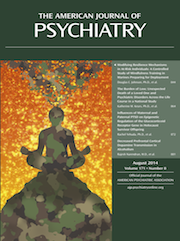The Burden of Loss: Unexpected Death of a Loved One and Psychiatric Disorders Across the Life Course in a National Study
Abstract
Objective
Unexpected death of a loved one is common and associated with subsequent elevations in symptoms of multiple forms of psychopathology. Determining whether this experience predicts novel onset of psychiatric disorders and whether these associations vary across the life course has important clinical implications. The authors examined associations of a loved one’s unexpected death with first onset of common anxiety, mood, and substance use disorders in a population-based sample.
Method
The relation between unexpected death of a loved one and first onset of lifetime DSM-IV disorders was estimated by using a structured interview of adults in the U.S. general population (analytic sample size=27,534). Models controlled for prior occurrence of any disorder, other traumatic experiences, and demographic variables.
Results
Unexpected death of a loved one was the most common traumatic experience and most likely to be rated as the respondent’s worst, regardless of other traumatic experiences. Increased incidence after unexpected death was observed at nearly every point across the life course for major depressive episode, panic disorder, and posttraumatic stress disorder. Increased incidence was clustered in later adult age groups for manic episode, phobias, alcohol use disorders, and generalized anxiety disorder.
Conclusions
The bereavement period is associated with elevated risk for the onset of multiple psychiatric disorders, consistently across the life course and coincident with the experience of the loved one’s death. Novel associations between unexpected death and onset of several disorders, including mania, confirm multiple case reports and results of small studies and suggest an important emerging area for clinical research and practice.



